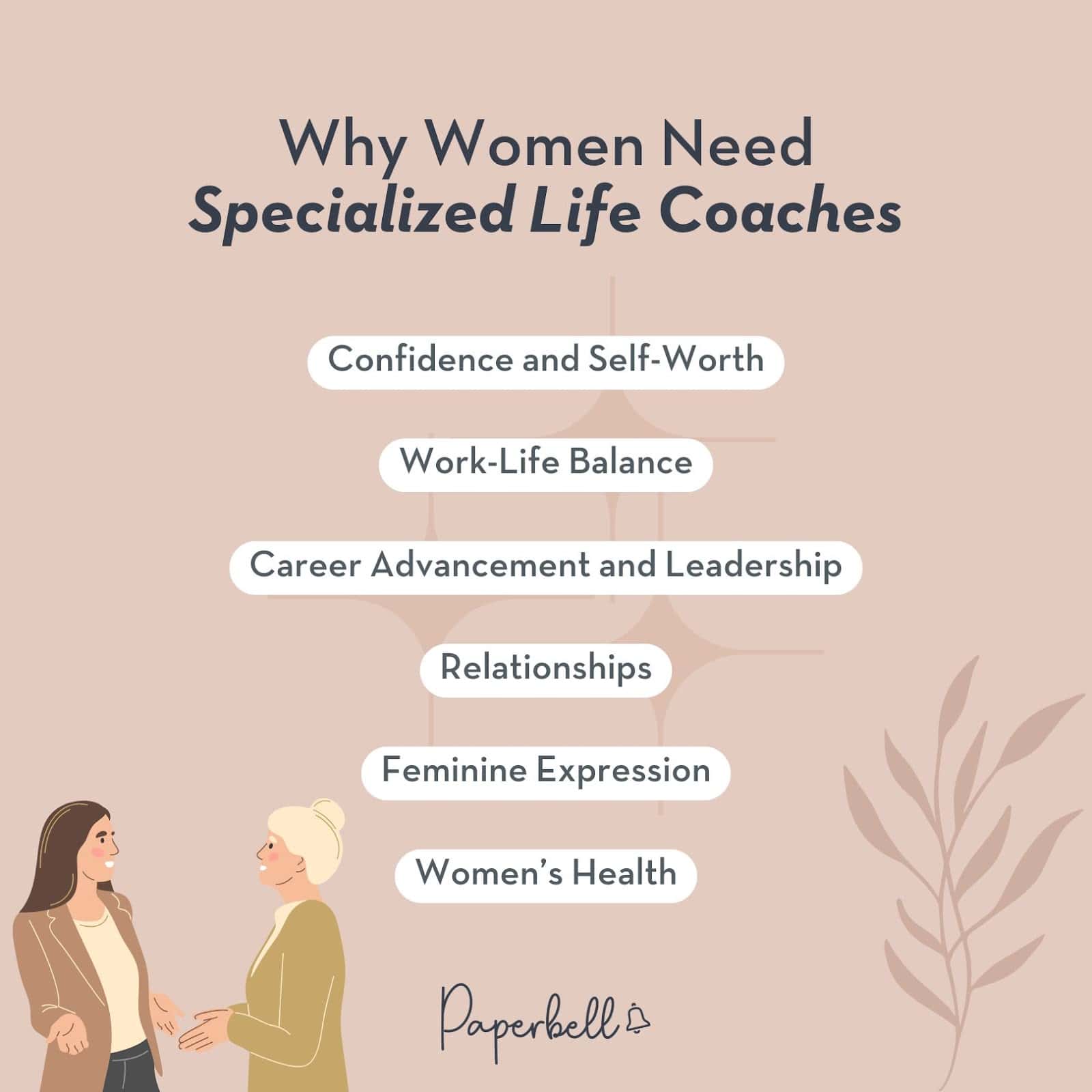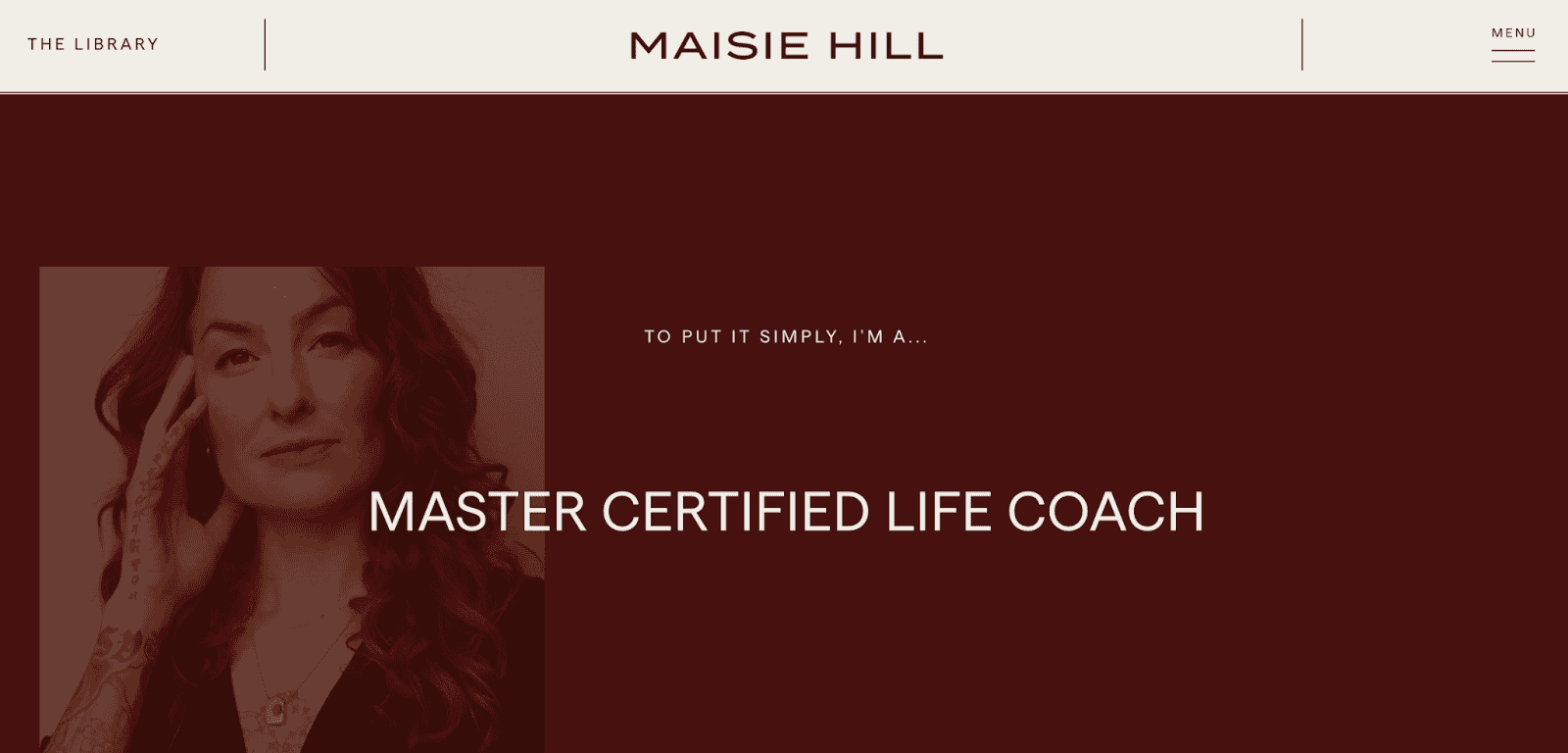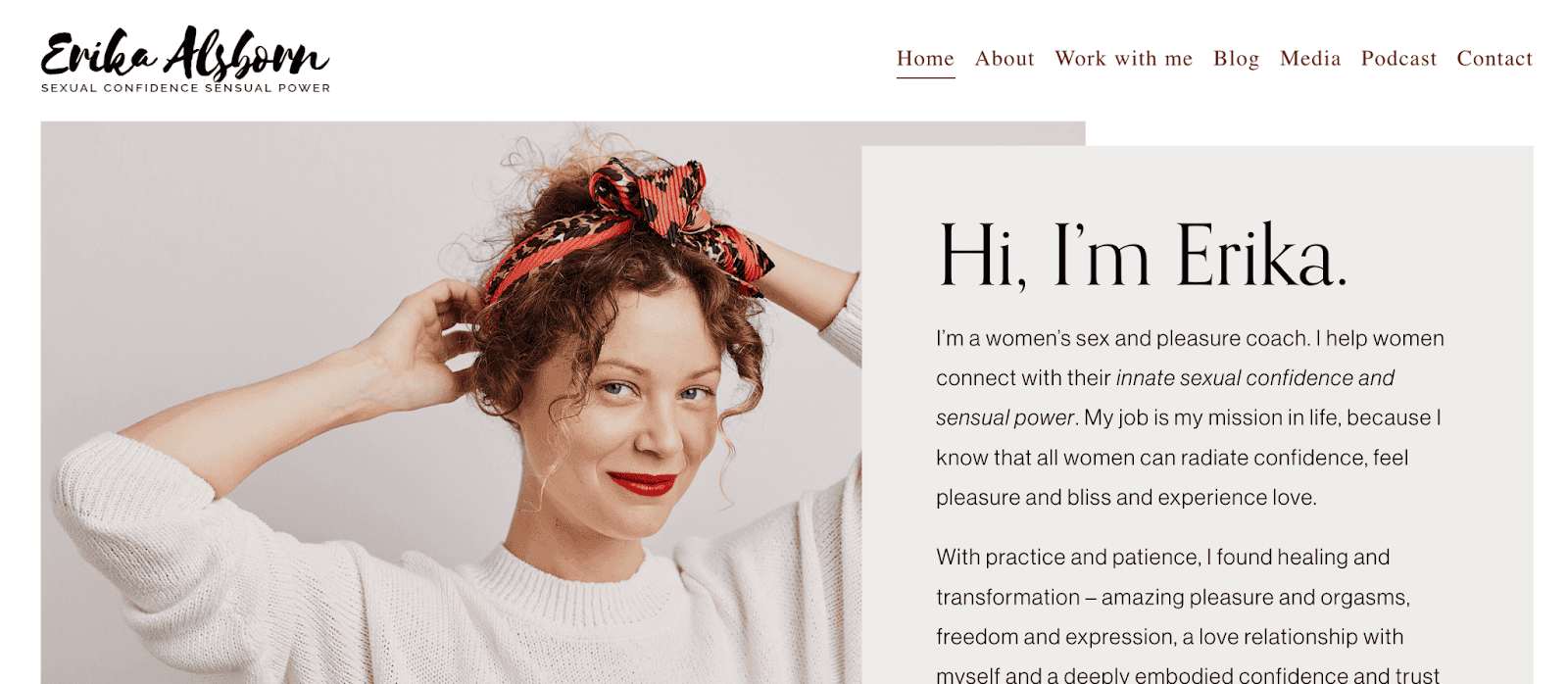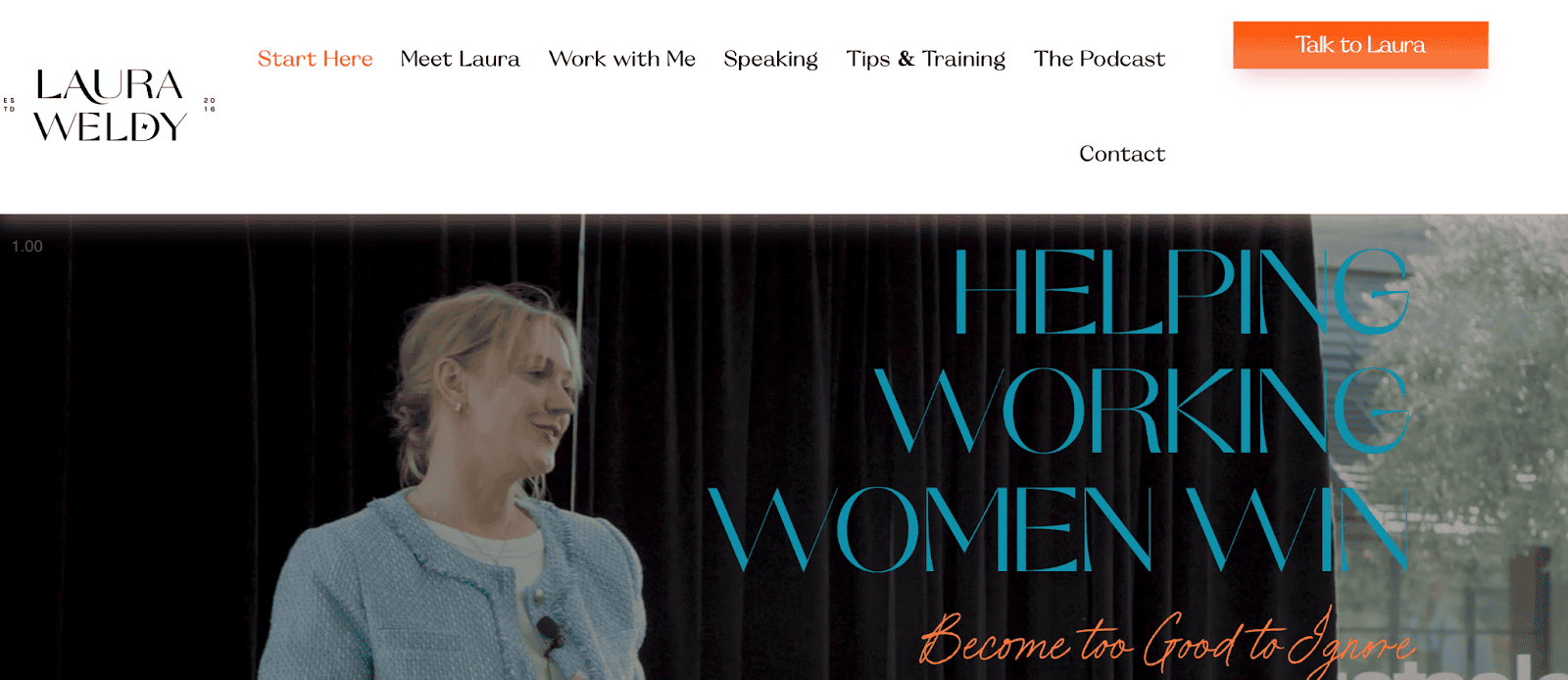Life coaches who specialize in supporting women offer targeted guidance for issues that uniquely affect them, like rebuilding their confidence in the face of societal expectations or improving their hormonal health.
Let’s explore what women’s life coaches do and how you may become one.
Why Do Women Need Specialized Life Coaches?
Women’s life coaches address challenges more commonly faced by women, and as such, require specialized expertise.
General life coaching can address these areas too, but women-specific coaches can tailor their approach to these unique experiences and provide more relevant support.
Here are some areas women’s life coaches commonly focus on.
1. Confidence and Self-Worth
From a young age, girls are often encouraged to be agreeable, nurturing, and self-sacrificing, while boys are encouraged to be assertive and independent.
Women are also taught to strive for unrealistic beauty standards and to put the needs of others before their own.
Women’s coaches can help them recognize deep-seated beliefs that stem from societal conditioning and learn to prioritize and advocate for themselves.
2. Work-Life Balance
Statistically, women are more likely to handle the majority of unpaid domestic labor and caregiving responsibilities, even if they work full-time. This can lead to burnout and difficulty prioritizing personal growth or career advancement.
Other studies show that mothers often face career setbacks (lower pay, fewer promotions), while fathers tend to be seen as more responsible and reliable employees.
Though coaching isn’t enough to shift systemic bias, it can help women set boundaries and negotiate their needs with their families and employers.
3. Career Advancement and Leadership
When women act assertively and show ambition, they are often perceived as “bossy” or “difficult,” whereas men exhibiting the same behaviors are seen as strong leaders. Female leaders face further negative biases, such as being “too emotional,” despite several studies disproving these misconceptions.
These harmful stereotypes can lead women to develop impostor syndrome even in positions they are overqualified for. They also face difficulties getting promoted and paid equally to their male counterparts.
Coaching can help women build confidence in their leadership abilities, challenge their limiting beliefs, and develop strategies to navigate workplace biases.
4. Relationships
Women are often expected to take on the emotional labor in the workplace and at home, from managing other people’s emotions to resolving conflicts at the expense of their own needs. This pressure can make it more difficult for them to say no and set healthy boundaries, afraid to let others down.
Coaching is an effective tool to help women shift their behavior patterns and redefine their roles in both personal and professional relationships.
5. Feminine Expression
Qualities associated with femininity, like empathy and intuition, have historically been undervalued and seen as a weakness, especially in business. Many women struggle with losing their identity and toning down their feminine traits to appear stronger and feel more accepted.
Coaching can help women reconnect with their femininity and express themselves in a more empowered and authentic way. This can transform the way they show up in all facets of their lives, from the boardroom to the bedroom.
6. Women’s Health
Most women don’t grow up with the vital knowledge needed to navigate their hormonal cycles. Their bodies are under-researched, and their concerns are often dismissed or misdiagnosed.
Women’s health coaches fulfill an important role by educating them on their hormonal health and overall well-being. They help women restructure their lives in a way that serves their mental and physical health better and may offer healing modalities they are trained in.
This needs more specialized expertise than life coaching or coaching people on their health in general.

3 Top Women’s Coaches to Follow
Maisie Hill

Maisie Hill is a Master Certified Life Coach, Hormone and Menstrual Cycle Expert, and bestselling author. She has 15 years of experience as a women’s health practitioner and birth doula, and her book Period Power is nothing short of life-changing—speaking from personal experience.
She helps women live in harmony with their cycles while dismantling societal programming around their bodies.
Erika Alsborn

Erika Alsborn is a Women’s Sex and Pleasure Coach with a Master’s Degree in Sexology. Her mission is to help women radiate confidence, feel pleasure, and experience love. She guides her clients to reconnect with their sensuality and innate power.
Laura Weldy

Laura Weldy is a Career Coach who works with mid-career women to unlock their full potential at work without sacrificing other areas of their lives. She helps them find alignment in their ambitions, overcome limiting beliefs, and take empowered steps toward their futures.
How to Become a Life Coach for Women

If you’re feeling the nudge to coach women, here are a few specialized certifications you can consider.
- One of Many’s Certified Women’s Coach Training – A comprehensive, ICF-accredited, 12-month program with in-depth practical training and one-on-one mentoring at £5,495.
- Girls Gone Strong’s Women’s Coaching Specialist Certification – A self-paced, comprehensive, and evidence-based training developed by women’s health experts at $1500.
- Health Coach FX’s Woman Empowerment Coach Certification – A 6-month long ICF-accredited training using the Embodied Transformation Framework™ (you may inquire about up-to-date fees at the training center).
FAQ
What Does a Life Coach for Women Do?
A women’s life coach helps their clients deal with issues commonly affecting women, such as imposter syndrome, juggling career and motherhood, or body image struggles. They use structured frameworks and accountability tools to help women define and achieve their goals.
How Do I Choose the Right Coach?
Look for a professional who has proven expertise in your needs. You may review their qualifications and testimonials from previous clients. Choose someone whose life philosophy and coaching style resonate with you.
How Much Does It Cost to Get a Life Coach?
Coaching fees range from $50 to $500+ per session depending on the coach’s expertise and the format of their coaching packages.
What Tools Do I Need to Become a Life Coach for Women?
You’ll need coaching frameworks and other tools specific to your niche. For example, if you specialize in women’s health, you must know how to apply cycle synching. You’ll also need a client management system to run your practice (bookings, payments, unique packages, etc.) like Paperbell.
Do I Need Certification to Become a Life Coach?
It’s not legally required, but certification in life coaching or your niche specialty can boost your credibility and give you the practical expertise to create better results for clients.
Get Your Practice Organized
If you want to become an effective coach, you need to make sure that running your practice requires minimal energy. In other words, you need an automated client management system.
Paperbell handles everything, from your coaching website to your bookings, payments, and contracts. It lets you create installment plans and subscriptions, run client surveys, provide clients with a self-service portal, and a lot more.
Try Paperbell for free and discover how it can transform your business.










